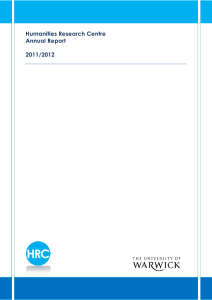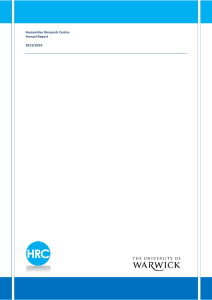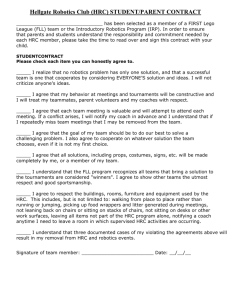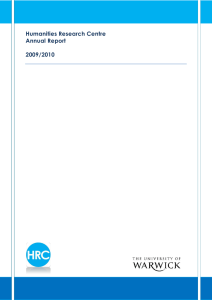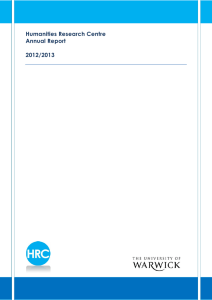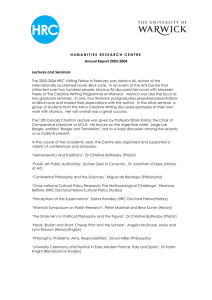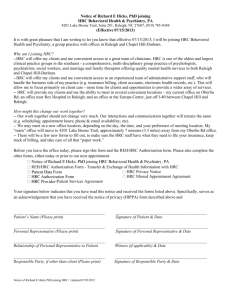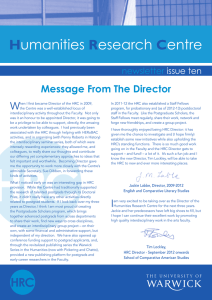Humanities Research Centre Annual Report 2010/2011
advertisement
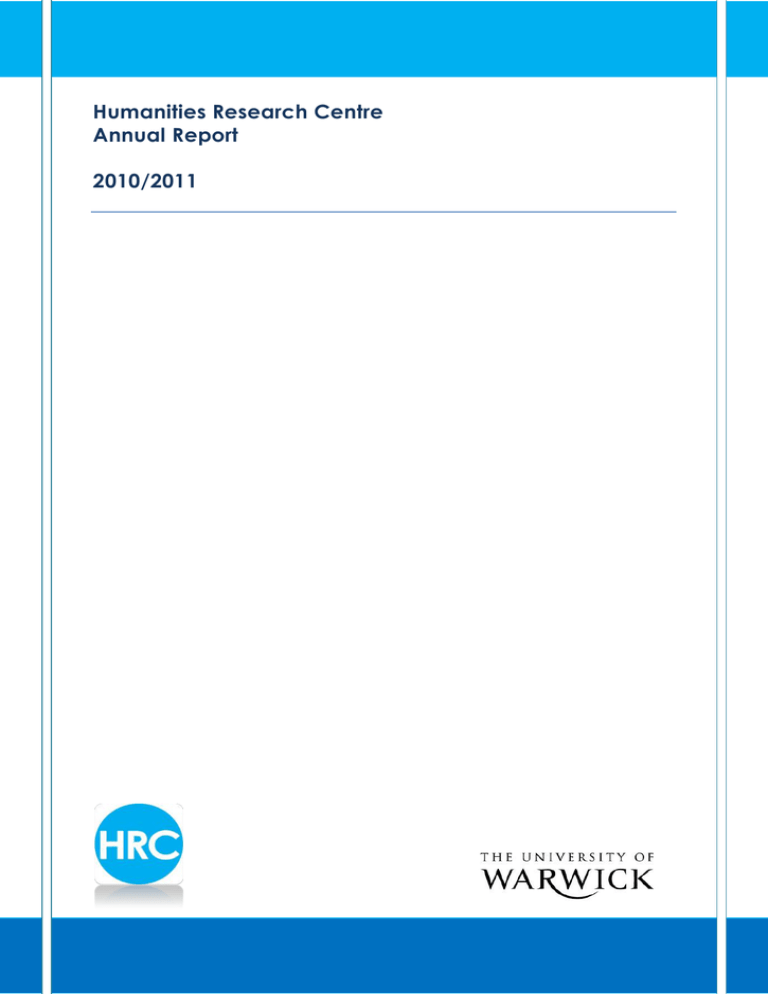
Humanities Research Centre Annual Report 2010/2011 In the course of the academic year, the Centre organized and supported a variety of conferences, lectures, seminars, and other events: Performing the Self: Women's Lives in Historical Perspective The Useable Past in 17th Century England Literature of an Independent England The Postmodern Palimpsest: Narrating Contemporary Rome Idle and Disorderly Persons: The Representations and Realities of the Mobile Poor in Early Modern England Spanish/French Marriage Festivals and Politics 1612-1615 Sing aloud harmonious spheres: Music, Philosophy and the Order of the Universe in the Renaissance Warwick Research Symposium on Parish Research Beyond Calypso: new perspectives on Samuel Selvon The 19th Annual Donald Charlton Lecture was given on 16th November 2010 by Professor Samik Bandyopadhyay. His topic was ‘Living Many Cultures Simultaneously: The Problematic Indian Experience’. He addressed the importance of looking to oral culture and traditions in order to approach knowledge about embodied Indian life. Arguing that each region and state has its particular heritage as well as local languages and linguistic practices, and that theatre and performance convey the most about Indian life when grasped through these forms, Professor Bandyopadhyay singled out Manipur for special attention as a case study of the multiplicity of cultures co-existing within it and the contradictions of the nation-state in relation to its regional history and identity. Accounting for the violence of Manipur’s history in terms of its struggle for recognition and autonomy within the Indian national project, and also as a result of state violence, Bandyopadhyay stressed the necessity of acknowledging parallel and often incompatible concepts of citizenship and national belonging. Professor Bandyopadhyay was visiting Warwick as part of a delegation from Jawaharlal Nehru University that had been participating in a colloquium during the previous week in the School of Theatre, Performance, and Cultural Policy Studies. The School and the School of Arts and Aesthetics at JNU have had an on-going research collaboration for the past two years. Seven Warwick staff travelled to Delhi in March 2010 for a similar colloquium hosted by JNU. Professor Peter Lake (Vanderbilt) was the HRC Visiting Fellow this year and spoke on 9th March about 'Elizabethan Politics and the Origin of the History Play'. Professor Lake made a good case why politics mattered. He suggested that in the later Tudor state, the succession was a key concern around which public interest and discussion swirled and that history was the lens through which discussions of the dynastic contests could take place. Using the past to talk about the present was thus a means of legitimising discussion about subjects that might otherwise be very difficult to stage and hence the history play became a key way of talking about contemporary concerns about the nature of politics. Dramatising the present became possible by cloaking the present in the past and audiences, well-versed in classical as well as more recent history, would pick up on the allusions being made and draw inferences from them. Thus Professor Lake’s investigations into court politics thus became intertwined with an investigation of the literary productions of the time that discussed them; and he urges historians to make more use of literary sources. During his visit Professor Lake also made a podcast with the Early Modern Forum in which he discusses his favourite historical sources. For those of you who might have missed the lecture this gives a taster of Professor Lake’s ideas. He talks about the advantages and challenges of historians using literary sources, such as plays, and talks about what makes good and bad history, as well as what his favourite secondary source is (you’ll have to listen to find out!). The podcast can be found at http://www2.warwick.ac.uk/fac/arts/history/emforum/favourites/ Sidelights on Shakespeare – Seminar Series The HRC was pleased to sponsor a new seminar series entitled Sidelights on Shakespeare. This seminar series embraced the plurality of Shakespeare(s), historical and contemporary, and offered unusual and thought-provoking perspectives from scholars working in a diverse range of faculties, disciplines and theoretical fields. Through sideways explorations of the ways in which aspects of Shakespeare are interpreted, packaged, enlisted and attacked, the series illuminated what it is that continues to make Shakespeare so broadly important. Arts Faculty Seminar Series Once again the HRC was able to sponsor the Arts Faculty Seminar Series enabling postgraduate students from the Faculty of Arts to meet every few weeks for research seminars. The aim of the seminar series was to broaden awareness of the doctoral work taking place within the faculty; the events also created a relaxed forum for young researchers to practice presenting their work. The seminars provided an opportunity for all students to offer valuable feedback on this work, strengthening their critical tools and expanding their inter-disciplinary experiences, and fostering a great sense of community. The HRC continues to support interdisciplinary arts and humanities research in a variety of ways. Newsletter The 8th issue of the HRC Newsletter was published. The Newsletter showcases research being carried out by the arts and humanities community at Warwick as well as advertising forthcoming HRC events. It is mailed out to the arts and humanities departments of every major UK HEI as well as other arts organisations and many overseas institutions. Doctoral Fellowships This year the Centre was able to sponsor four (internal) Doctoral Fellowships. The Fellows contribute to the life of the HRC by organising a one-day postgraduate interdisciplinary conference and are given financial support for their PHD dissertation research. The fellowships were awarded to: Katharina Karcher and Elizabeth Ramirez (German / Film and TV Studies) Beyond Experience: (Re)thinking Women, Violence and Trauma Gabrielle Mearns (English) Unplanned Wildernesses: Narrating the British Slum 1844 – 1951 Joseph Morrissey and Kate Scarth (English) Spaces of Work, 1770 - 1830 Victoria Turner and Virginie Sauzon (French) Voicing the Community: Questioning Race and Gender in French and Francophone Literature HRC/Warwick Series in the Humanities: Pickering and Chatto Publishers: the new publishing agreement with Pickering and Chatto, the Warwick Series in the Humanities, now has its first contracted monograph. Classicism and Romanticism in Italian Literature: Leopardi’s Discourse on Romantic Poetry by Fabio Camilletti (Italian) will be published in early 2013. Four other proposals are currently being considered for the series. The HRC Postgraduate Scholars program began very well. Nine PhD students from across the Faculty (including Philosophy) worked together to share their research, learn from each other’s research, and find new ways to bridge disciplines. Their culminating project, Kaleidoscope, was an impressive event, a two-day conference and workshop that combined traditional academic papers with practical and participatory painting, drama and dance workshops. Next year’s group has now been selected and will see students from a variety of departments undertake the challenge of true interdisciplinary work. Future Projects We are pleased to announce that the 20th Donald Charlton Lecture will be given by Professor Marvin Carlson. Professor Carlson is the Sidney E. Cohn Professor of Theatre and Comparative Literature at the Graduate Center of the City University of New York. He is the founding editor of the journal Western European Stages and the author of over two hundred scholarly articles and fourteen books in the areas of theatre history, theatre theory, dramatic literature, and performance studies. His work has been translated into fourteen languages. The HRC Visiting Fellow for 2011-12 will be Patrick Keiller, a Research Fellow in the Department of Communication Art and Design at the Royal College of Art. He studied architecture at University College London and fine art in the Department of Environmental Media at the RCA. He is a director, writer, cinematographer and lecturer. His films include London (1994), Robinson in Space (1997), The Dilapidated Dwelling (2000) and Robinson in Ruins (2010) Forthcoming Conferences including the Doctoral Fellowship winners: Beyond Experience: (Re)thinking Women, Violence and Trauma Unplanned Wildernesses: Narrating the British Slum 1844 – 1951 Spaces of Work, 1770 - 1830 Voicing the Community: Questioning Race and Gender in French and Francophone Literature Politics and the Individual: French Experiences, 1930–1950 British Society for the History of Science Postgraduate Conference Beginning in the 2011-12 year, the HRC will also sponsor the Staff Fellows Program. All probationary members of staff in the faculty will be invited to join together to share work, find new ways to work together, and get to know each other. Part of their remit will be to share information, network, and gain training in applying for funding. It has been agreed with the LDC that participation will gain credit towards certain aspects of PCAPP. The HRC has also reaffirmed its commitment to support students undertaking the MRes degree. To this end, Margaret Shewring in Theatre Studies will coordinate these students’ involvement in ongoing activities such as the Faculty PGR skills training program and the University’s poster competition. In addition, the HRC has made available a small sum of money specifically to support MRes student-led activities. Concluding Remarks Over the past year humanities scholars have witnessed what to many feels like direct and sustained broadsides on the worth and necessity of the arts to public life. However, as HRC Director I am heartened by the ways in which the humanities at Warwick continue to flourish. The work undertaken by scholars at our university demonstrates, to colleagues at Warwick outside our disciplines and to the wider academic and general public, that arts and humanities research not only maintains its relevance, but that it sets the agendae of our modern world. The HRC would like to express its appreciation for the continued support, both financial and academic, of the University of Warwick. Finally, as Director I would like to note the continuing exemplary service of the HRC Secretary, Sue Dibben, to whose administrative skill and dedication to the aims and ideals of the HRC and the rest of the Arts Faculty are deeply indebted. Professor Jackie Labbe, August 2011.
